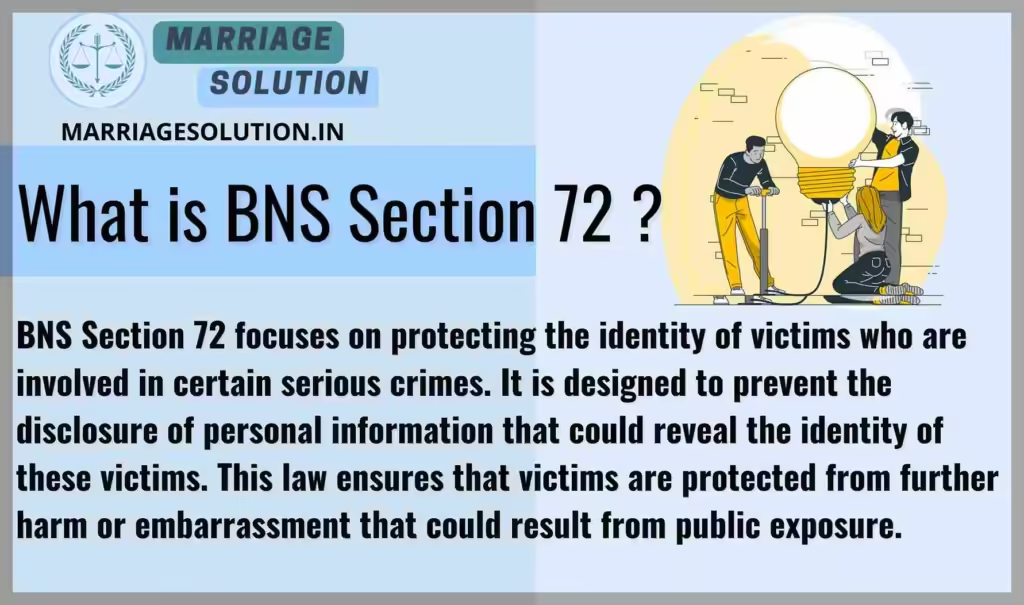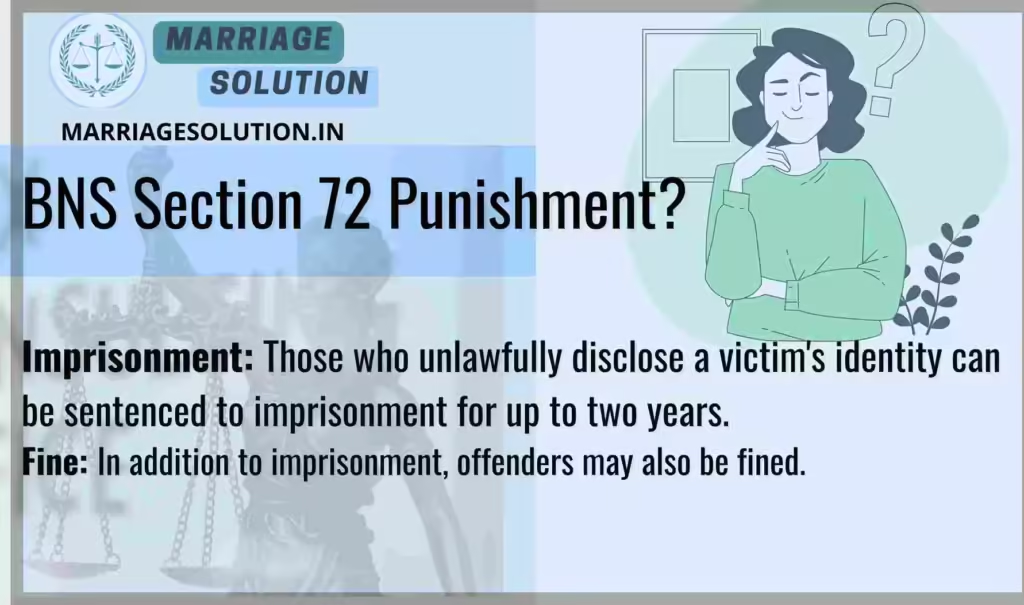Introduction of BNS Section 72
BNS Section 72 deals with the prohibition of disclosing the identity of victims in sexual offence cases, ensuring their dignity, safety, and privacy. It strengthens the safeguards earlier provided under IPC Section 228A by widening the scope of what counts as disclosure. This comparison highlights how the new BNS provision enhances victim protection, addresses loopholes in the IPC, and reflects India’s commitment to a more sensitive and victim-centric justice system.
- Introduction of BNS Section 72
- What is section 72 of BNS ?
- BNS Section 72 in Simple Points
- Section 72 BNS Overview
- BNS 72 Punishment
- BNS 72 bailable or not ?
- Bharatiya Nyaya Sanhita Section 72
- BNS Section 72 FAQs
- If you need support with court proceedings or any other legal matters, don’t hesitate to reach out for assistance.
What is section 72 of BNS ?
BNS Section 72 focuses on protecting the identity of victims who are involved in certain serious crimes. It is designed to prevent the disclosure of personal information that could reveal the identity of these victims. This law ensures that victims are protected from further harm or embarrassment that could result from public exposure.

BNS Section 72 in Simple Points
BNS Section 72 deals with the protection of victims’ identities in serious offences such as sexual assault, abuse, and similar crimes. It ensures that victims are not further harmed, stigmatized, or harassed by prohibiting the publication or disclosure of any information that may directly or indirectly reveal their identity.
(This provision corresponds to the repealed IPC Section 228A and has been updated under the Bharatiya Nyaya Sanhita (BNS), 2023.)
1. Meaning of Section 72
- BNS Section 72 makes it illegal to print, publish, or disclose any details that can reveal the identity of victims in serious crimes.
- Identity includes name, address, photograph, workplace, family details, or any clue that connects to the victim.
- The aim is to protect the dignity, privacy, and mental well-being of the victim.
- Exceptions exist where identity can be disclosed with consent, lawful order, or authorization by next of kin or recognized institutions.
2. Purpose of Section 72
The main purpose of this section is to:
- Safeguard victims from public embarrassment and trauma.
- Encourage victims to report crimes without fear of social exposure.
- Prevent misuse of media and public platforms that could sensationalize sensitive cases.
- Uphold the privacy, dignity, and rights of victims in the justice process.
3. Essential Ingredients of Section 72
For this section to apply, the following conditions must exist:
- Act of Disclosure – Identity of the victim is revealed through print, digital, verbal, or other means.
- Type of Crime – The offence involves serious crimes like sexual assault or abuse.
- No Legal Exception – Disclosure is made without lawful consent, police necessity, or next-of-kin authorization.
- Intent/Knowledge – The person knowingly or negligently discloses the identity.
4. Punishment under BNS Section 72
- Imprisonment: Up to 2 years
- Fine: Additional fine may also be imposed
- Both imprisonment and fine can be awarded together.
The rules of bailability and cognizability:
- Bailable – Accused can get bail.
- Cognizable – Police can register and investigate without prior court approval.
- Trial by – Any Magistrate.
5. Examples of Section 72 in Action
Example 1: A newspaper publishes the name and photo of a rape victim. This violates Section 72, and the publisher can be punished.
Example 2: A police officer leaks a victim’s address during an investigation. This is a punishable offence under Section 72.
6. Importance of Section 72
BNS Section 72 plays a crucial role in ensuring:
- Privacy and dignity of victims in sensitive crimes.
- Responsible journalism and investigation practices.
- Victim protection against further trauma, harassment, or stigmatization.
- A more victim-centric justice system, balancing transparency with confidentiality.
By criminalizing the disclosure of victim identities, Section 72 strengthens faith in law and encourages more victims to seek justice without fear.
Section 72 BNS Overview
BNS Section 72 makes it illegal to print or publish any information that could reveal the identity of a victim involved in certain serious offenses, like sexual assault or abuse. If someone violates this section, they can face legal consequences, including imprisonment and a fine.
BNS Section 72 : 10 Key Points
- Victim Identity Protection: BNS Section 72 primarily serves to protect the identity of victims involved in specific serious crimes. This protection helps prevent further trauma or harm to the victims by ensuring their privacy.
- Prohibition of Publication: The law strictly prohibits the publication of any details that could reveal the identity of a victim. This includes the name, address, or any other information that could lead to identifying the victim.
- Punitive Measures: If someone is found guilty of violating this law by disclosing the identity of a victim, they can be punished with imprisonment for up to two years. This punishment acts as a deterrent to prevent such violations.
- Additional Fine: Alongside imprisonment, the offender may also be liable to pay a fine. This fine serves as an additional punishment to reinforce the seriousness of the offense.
- Specific Exceptions: There are certain exceptions under this section where the victim’s identity may be disclosed. These include situations where the victim gives written consent or when the disclosure is ordered by law enforcement officials for investigation purposes.
- Role of Police: Law enforcement officials, particularly the police, can disclose the victim’s identity if it is necessary for the investigation. However, this must be done in good faith and within legal boundaries.
- Authorization by Next of Kin: In cases where the victim is deceased, a minor, or mentally incapacitated, the next of kin may authorize the disclosure of the victim’s identity. However, this must be done carefully and under strict conditions to prevent misuse.
- Recognized Welfare Institutions: Recognized welfare institutions or organizations have the authority to be involved in the process of identity disclosure if authorized by the victim or next of kin. These institutions must be recognized by the government.
- Exclusion of Court Judgments: Publishing court judgments is not considered a violation of this section as long as the victim’s identity is not disclosed. This ensures that legal transparency is maintained without compromising the victim’s privacy.
- Emphasis on Privacy and Dignity: The overarching goal of BNS Section 72 is to safeguard the privacy and dignity of victims. By preventing unauthorized disclosure of their identity, the law seeks to protect victims from further harm or public scrutiny.
Examples to Illustrate BNS Section 72
- Example 1: A journalist publishes an article about a high-profile sexual assault case and includes details that could reveal the victim’s identity, such as their address or workplace. Under BNS Section 72, this journalist could be prosecuted, face imprisonment, and be fined for violating the victim’s privacy.
- Example 2: A police officer, during an investigation, reveals the identity of a victim to a third party without any legal requirement or good faith reason. This action would also be a violation of BNS Section 72, leading to potential legal action against the officer.
BNS 72 Punishment
Imprisonment: Those who unlawfully disclose a victim’s identity can be sentenced to imprisonment for up to two years.
Fine: In addition to imprisonment, offenders may also be fined.

BNS 72 bailable or not ?
BNS Section 72 is bailable. This means the accused can be released on bail while awaiting trial.
Comparison: BNS Section 72 vs IPC Section 228A (Disclosure of Victim’s Identity)
| Section | Offence | Punishment | Bailable / Non-Bailable | Cognizable / Non-Cognizable | Trial By |
|---|---|---|---|---|---|
| BNS Section 72 | Prohibits disclosure of the identity of victims of sexual offences and similar crimes (name, photo, address, workplace, family details, etc.). | Imprisonment up to 2 years and fine. Both may be imposed together. | Bailable | Cognizable | Any Magistrate |
| IPC Section 228A (Old Law) | Prohibited disclosure of victim’s identity in rape cases. Covered publication of name, address, or other identifying details without court or victim consent. | Imprisonment up to 2 years and fine. Same as under BNS, but limited mainly to rape-related offences. | Bailable | Cognizable | Any Magistrate |
BNS Section 72 FAQs
What does BNS Section 72 address?
It addresses the protection of a victim’s identity in cases involving serious crimes.
What is the punishment for violating BNS Section 72?
The punishment is imprisonment of up to two years and a fine.
Can the victim’s identity ever be disclosed under BNS Section 72?
Yes, but only under specific conditions, such as with the victim’s consent or an order from the police.
Is BNS Section 72 bailable?
Yes, it is a bailable offense.
Conclusion
BNS Section 72 modernizes and expands the protection against disclosing a victim’s identity in sexual offence cases, going beyond the old IPC Section 228A. While both provide imprisonment up to 2 years and fine, the BNS covers a wider range of sensitive details, ensuring stronger privacy safeguards and victim protection.
Need Legal Support?
If you are dealing with court cases, marriage problems, or any other legal issue, our team at Marriage Solution – Lawyer Help is here for you. Simply fill out our quick online enquiry form, and we’ll connect you with the right legal expert to support your needs.
Finished with BNS 72 ? Continue exploring the next provisions of the Bharatiya Nyaya Sanhita (BNS), 2023. Each section includes explanations, examples, and plain-language breakdowns for easy understanding.
- BNS Section 73 : Printing or publishing any matter relating to Court proceedings without permission.
- https://marriagesolution.in/bns_section/bns-section-73/
- Section 74 BNS : Assault or criminal force to woman with intent to outrage her modesty.
- https://marriagesolution.in/bns_section/section-74-bns/
- BNS Section 75 : Sexual harassment and punishment for sexual harassment .
- https://marriagesolution.in/bns_section/bns-section-75/
- BNS Section 76 : Assault or use of criminal force to woman with intent to disrobe .
- https://marriagesolution.in/bns_section/bns-section-76/
- Section 77 BNS : Voyeurism .
- https://marriagesolution.in/bns_section/section-77-bns/
Full IPC Section List: https://marriagesolution.in/ipc-section-list
All Indian Law & Blogs: https://marriagesolution.in/indian-law/
Full BNSS Section List: https://marriagesolution.in/bnss_section-list
